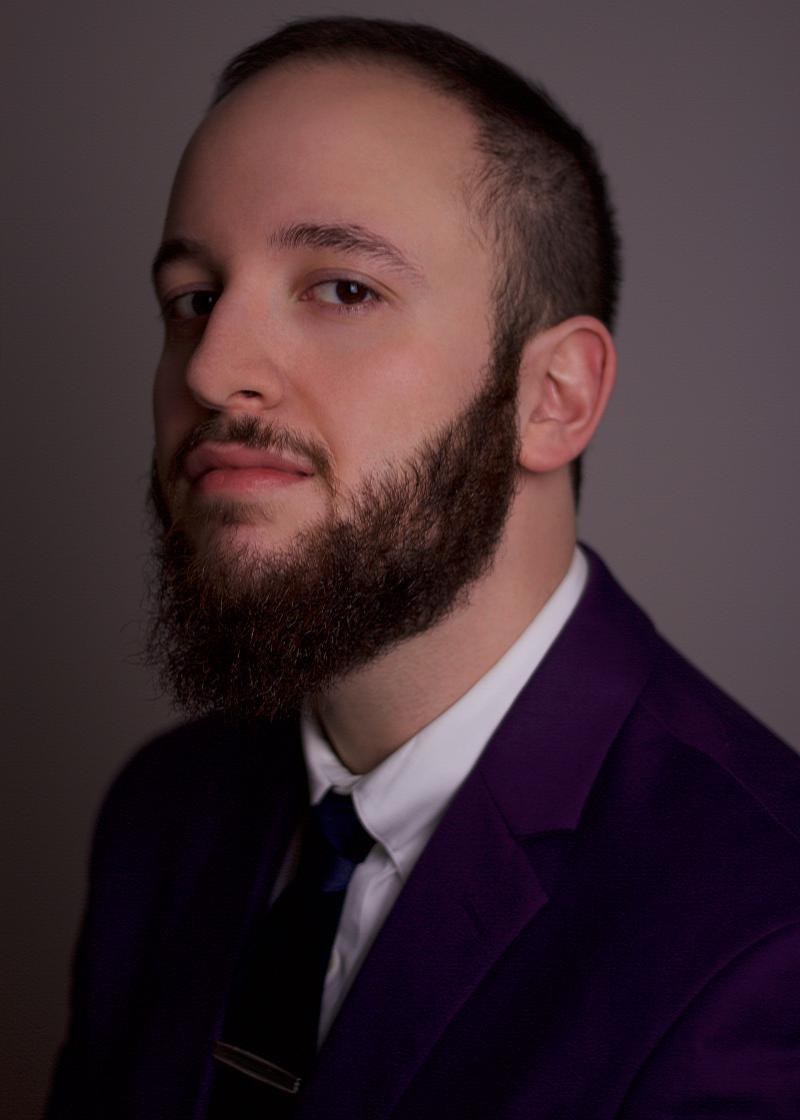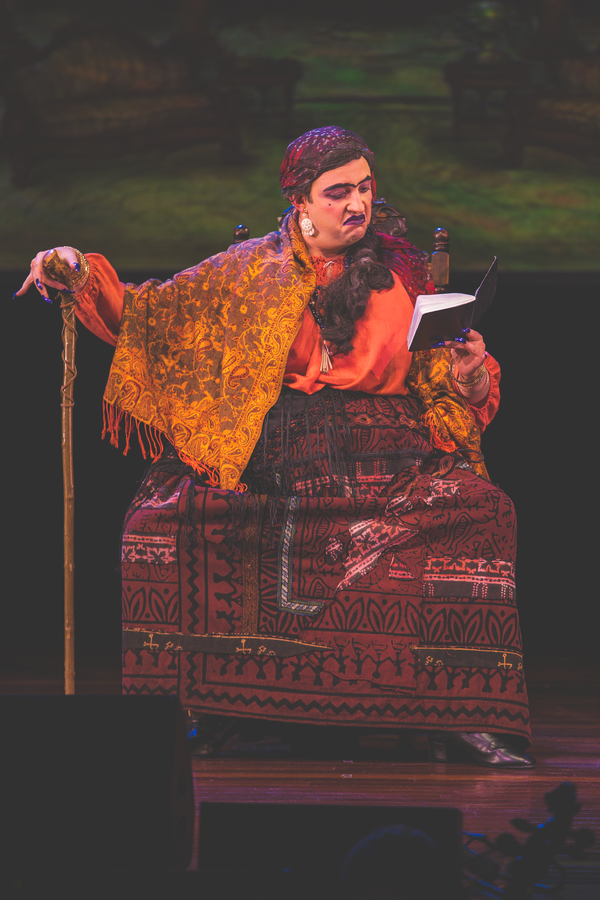Interview: Mikhl Yashinsky Gets Ready to Make Magic on Stage in NYTF's THE SORCERESS

This December, escape to a magical world of fantasy and illusion with National Yiddish Theatre Folksbiene's The Sorceress, running December 8 - 29, 2019. A fairytale-like story of a pure-hearted young woman who triumphs over her tormentors, a scheming stepmother, and a wicked witch.
This musical by Avram Goldfaden is one of the very earliest works of Yiddish theatre and the first to be produced in America. The fully restored orchestrations are based, in part, on pre-Holocaust musical arrangements which were saved from destruction at the hands of the Nazis by the famed "Paper Brigade" of the YIVO in Vilna, who risked their lives to save thousands of unique documents and manuscripts. This fully-staged work is the culmination of a project which NYTF begin in 2017 to restore this classic.
At the center of the story is Bobe Yakhne, played by Mikhl Yashinsky. Mikhl returns to the role after having starred in the NYTF's 2017 production of the show, and below, he tells us all about why he can't wait to bring the story to audiences once more!
How/when did you originally become involved with this project?
When the Folksbiene was holding auditions for the reading of the operetta two years past, I was working as a teacher, researcher, and translator at the Yiddish Book Center in Amherst, MA, while acting on the side. We had a group of artists in residence there one week, seeking to learn about Yiddish culture and gain inspiration for their projects. A few of them were curious about any connections between Yiddish and the occult. And so I did my research for them, presenting them with ethnographies of "opshprekherkes" - conjuring-women of the shtetl paid to ward off the evil eye - and tales of demons and dybbukim. I also thought of Goldfaden's operetta, and after a Google search, found that the Folksbiene was preparing a new production thereof, and holding auditions! I printed out the notice and encouraged an actress in the group to go out for it. Lacking Yiddish ability, she demurred, but spent the rest of the program hassling me to apply, even telling my supervisors that they must give me a day off to go audition.
And so I did. I learned some tattered pages of sheet music, from a different show, that I had found in the Yiddish Book Center's vault, and took the Peter Pan bus down to the city. The audition (which I did entirely in Yiddish, including banter with the directors Zalmen Mlotek and Motl Didner) went well, and I was asked to return with music prepared for the romantic tenor, the butcher, and... as casting director Jamibeth Margolis informed me by phone on my bus-ride back to Western Mass., the Sorceress herself (a role traditionally done in drag). Then another round of buses back and forth, a skirt bought at a charity shop (I felt the need of a material aid for all the sinister swishing I wanted to do at the audition), and I won the title part, and played it in the reading.
It was a joy such as I had only anticipated in my most enchanted dreams. And this December, the dream recurs, in truer technicolor, as I take a leave from my role in the Yiddish-language Fiddler on the Roof currently playing in midtown to take up Bobe Yakhne's rags once more, now in a full production.
How would you describe this show in a nutshell?
It is melodramatic, operatic, romantic, exotic, fantastic entertainment such as would have delighted the Jews of Eastern Europe at its premiere in 1877 and still delivers its distinct charms to anyone, anywhere today, while still reeking wonderfully (and somehow refreshingly!) of its strange nineteenth-century perfume. There are scenes set in the lair where the witch does her divining, at a sixteen-year-old's birthday party in a beautiful garden, at a coffeehouse in Istanbul. It is nothing like a piece of musical theatre that would get written today, and thank God - and Goldfaden - for that!
What has been the most challenging part of playing this character?
Getting through doors was an interesting experience. I had to get accustomed to maneuvering backstage in the bodysuit I wore in the reading, equipped as it was with a massive bosom and padded posterior, along with voluminous skirts. I was always grateful for the dressers' help in lacing up my heeled boots. Oh, also wearing heeled boots. Ah, and doing all this while carrying a cane and accomplishing choreography and handling tarot cards, etc. - all with script in hand! As it was officially a reading, we were not allowed to be "off-book." Will be very exciting to free myself of said book in the full production, so I can have every extremity free to carry out my wicked work.
Are you channeling anyone in your interpretation of her?
 The Sorceress is called Bobe Yakhne, "Grandmother Yakhne." I thought much of my own bobe, Elizabeth Elkin Weiss, when I did the production in 2017. She had passed away only a couple years before, this professional actress and formidable woman, scholar, painter, and Yiddishist who was my grandmother. Unbidden by anyone on staff, I decided I must have long acrylic nails for the production, just like the ones she wore to such great effect on her own fingers. (Once faced with the choice of getting hearing aids and keeping her fake nails - which did not allow her to properly manipulate the hearing aids - she opted for the acrylics. Perfect hearing be damned! There is something to be said for things that bring pure aesthetic delight, and she knew it.)
The Sorceress is called Bobe Yakhne, "Grandmother Yakhne." I thought much of my own bobe, Elizabeth Elkin Weiss, when I did the production in 2017. She had passed away only a couple years before, this professional actress and formidable woman, scholar, painter, and Yiddishist who was my grandmother. Unbidden by anyone on staff, I decided I must have long acrylic nails for the production, just like the ones she wore to such great effect on her own fingers. (Once faced with the choice of getting hearing aids and keeping her fake nails - which did not allow her to properly manipulate the hearing aids - she opted for the acrylics. Perfect hearing be damned! There is something to be said for things that bring pure aesthetic delight, and she knew it.)
I try to capture her lust for life in every movement onstage. She was pure good, my bobe, and Bobe Yakhne is pure evil - but it is delight that drives them both, the pursuit of a mekhaye: a life-giving joy. It just so happens that my bobe sought to bring such mekhayes to others, too, and what makes Bobe Yakhne's life is ruining the lives of others. But the fearless joy, the theatricality, the seizing of life with both hands, dashing it into the cauldron, and seasoning it fiercely, with spice and vigor - all of that is there in both of these grand Jewesses.
Even the way I walked - my "Gramma Liz" had this way of ambling about a grocery store, resting on the cart with both arms, head swiveling around to examine the wares, and her body following suit, swaying behind her with a certain luxuriance. I did something like it when I moved as Bobe Yakhne, particularly when I was en route to plot some delicious scheme. My brothers noticed when they came to see the show, though I had not told them of my thinking in preparing the role. "You channeled Gram," they said. "It was like watching her on that stage." That I was managing to embody not just a woman, but that woman - this to me was the greatest compliment.
How would you sell this to non-Yiddish-speaking theatre-goers? Is it easy to follow along with the subtitles?
Do you know English and/or Russian? (The projected translation appears in both languages.) Then it's easy! Particularly as it's operetta, so we sing in lines that are long and arching, the words don't go by too quickly. And such words they are! Nectar-dripping, melodic, rhythmically punchy words in the language that is, as the Yiddish author Isaac Bashevis Singer called it in his Nobel lecture when he won the prize for literature, "the tongue of martyrs and saints, of dreamers and cabalists - rich in humor and in memories that mankind may never forget." And so should The Sorceress not be forgotten. It is too fun, too weird, too magical.
What has been the most rewarding part about working with NYTF?
To work with such people as Mlotek and Didner and all the Folksbiene staff, people who are committed to the mission of this organization that is over 100 years old: that is, to dust off the theatrical treasures of this beautiful, besieged culture, this living culture, to celebrate them, and to display them to greatest and most artistic effect before the eyes of the world, both Jewish and Gentile. As a Yiddish-speaking artist, a person committed to the past and the present of this linguistic tradition, it brings me great joy to work alongside them, to join my hands to theirs in the carrying of this torch, and holding it high.
And to be presenting foreign-language art, Jewish art, in this country, at a time when Jews are attacked while praying in shul, when refugees are denied entry at the border and thrown into camps, when people are viciously discriminated against just for speaking their native tongue on the streets - I feel it is particularly right to be doing such work now. In such a multilingual city as New York, it seems to me that half of the shows presented on our local stages ought to be in languages other than English. Let us hear them all, whooped and warbled to the rafters, in their rich and dazzling variety!
Why do you think people should come out and see The Sorceress?
In one vivid duet, the witch blares to her young prey, the sweetly singing ingénue Mierele, "Kim, kim, kim tsi mir / Kim tsi mir in shtib atsinder!" ("Come, come, come to me! / Come to my house, now!") I cannot put it more forcefully than she. And the feeling heart cannot help but thrill to the strange siren song of The Sorceress. So open your mind and your ears and come, come to me. Have no fear. For the likes of you, I have nothing wicked planned. I will save it for my fellow players.
What are you most looking forward to in the run ahead?
I have recently been at work translating the 1920s memoirs of Esther-Rokhl Kaminska, the "mame" of Yiddish theatre, and she writes of auditioning for the composer Goldfaden, he accompanying at the piano, and later playing Mirele as a young actress in The Sorceress, fresh out of the shtetl. To translate such experiences from the dusty pages of the archive, and now to translate them into living word and gesture upon the stage? My whole personage -my very soul! - tingles in anticipation of this privilege, this all-consuming and life-giving delight, this mekhaye.
For tickets visit NYTF.org or call 212-213-2120 Ext. 200. For group sales and membership call 212-213-2120 Ext. 204.
Yashinsky was born in Detroit and educated at Harvard, where he studied modern European history and literature. Acting: Nokhum/Mordkhe (Fidler afn dakh), Tankhum (Der goylem), Guildenstern (R&G Are Dead). Directing: Brundibár, The Happy Prince (Michigan Opera Theatre); Tosca (Lowell House Opera). Translates Yiddish poetry and theatrical memoirs. Taught the language at the University of Michigan. For his own bobes and his mother, who have demonstrated to him the formidable magic of Jewish womankind.

Videos

